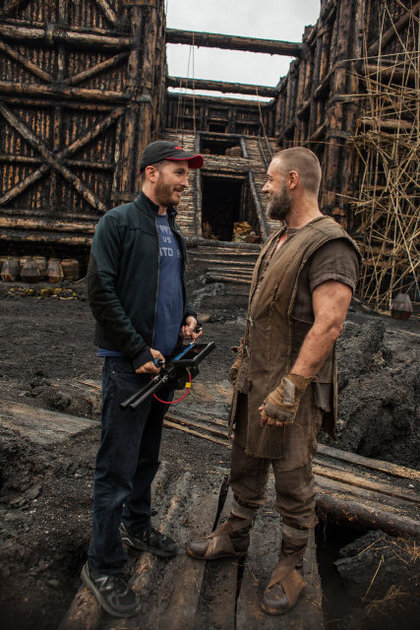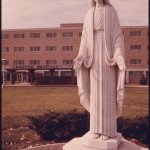
Because it’s not enough just to not care for a movie. De gustibus non est disputandum, you say? You have no idea what kind of fire you are playing with, you innocents! Because Aronofsky’s “Noah” in like gnostic nitroglycerin, and, believe it or not, it. will. destroy. your. soul.
Or at least that’s what this professor writing at Aleteia seems to think. You know what goes with gnosticism, right? Secret Keys goes with gnosticism, like peas go with carrots.
It’s funny that Fr. Robert Barron missed seeing this sinister plot as it unfolded right before his very eyes. Maybe that’s because it’s complete and utter nonsense?
“NOOOOOOOOOOOOOOOOOOOOOOOOOOOO! It must be true, Frank! You’re just too trusting, gullible, and naive to notice. That, and the fact that you’re just a guy with a blog, who likes beer, and has no idea whether movies are any good or not.”
Yeah, well. Color me unperturbed by the Noah Is Gnostic Nonsense course correction that the enemies of the film are tacking with now.
Need answers about this from someone more knowledgeable than Joe Six-Pack? Meet Peter T. Chattaway, an Eastern Orthodox film critic, and the Patheos duty expert around the subject of this particular film.
Thanks to a lengthy blog post by Brian Mattson, a theologian with the the Center for Cultural Leadership in California, the latest meme to work its way into public discussion of Darren Aronofsky’s Noah is that the film is somehow Gnostic, and that it presents a worldview in which God is really Satan and vice versa.
Is there anything to Mattson’s claims? Not really, and here’s why.
First, like a lot of successfully misleading claims, Mattson’s has a fair bit of truth. And one of the key truths he elucidates is that Noah, like other Aronofsky films, borrows some of its ideas from a form of Jewish mysticism known as Kabbalah.
Aronofsky has never made a secret of this, or of his interest in Kabbalah in general.
****
These may include the fact that Adam and Eve are presented as luminescent beings before the Fall, or the fact that the fallen angels depicted here are redeemed in the end, or the fact that the film divides the human race into the evil descendants of Cain and the better descendants of… one of Adam and Eve’s other sons.
But there is nothing particularly sinister about any of these claims.
For example, the association of light and holiness is found throughout the scriptures.
Exodus 34 tells us that Moses’ face was so bright, following his face-to-face encounters with God, that the Israelites were “afraid to come near him.” Moses compensated for this by wearing a veil when he moved among his fellow Israelites.
In the gospels, Jesus shines with a blindingly bright light at his Transfiguration, when three of his closest disciples see him talking to Moses and Elijah. And Jesus himself — echoing Old Testament prophets like Daniel — says that, at the end of time, “the righteous will shine like the sun in the kingdom of their Father.”
So it’s really not much of a stretch to imagine that Adam and Eve were similarly illumined in their pre-fallen state. In fact, the notion that Adam and Eve wore garments of light before the Fall — before they became naked and God gave them garments of skin instead — is quite common in at least some Christian circles.
How about Steven D. Greydanus’s thoughts on this latest attempt to sink Noah? It’s right here at the National Catholic Register, folks. And Greydanus will point you to Chattaway’s work as well as to this post by Ryan Holt entitled, Is Darren Aronofsky’s Noah Gnostic? Here’s a snippet,
…while I am convinced that Kabbalistic texts and ideas had some influence on Noah, I am considerably less convinced of the Mattson’s central thesis, which is that a specifically Gnostic ideology undergirds Aronofsky’s Noah. Mattson makes a significant error in conflating Kabbalah—Jewish mysticism—and Gnosticism, which are separate belief structures and have divergent attitudes towards creation. The Demiurge of Gnosticism, the evil deity who creates the world, is not a central tenet of Kabbalistic belief, and so Kabbalah does not view creation as intrinsically evil, even if it understands that it is broken. In Gnostic belief, the goal is to escape from the material into the eternal. In Kabbalistic belief, the eternal is actually capable of sanctifying the material.
Further complicating Mattson’s thesis is that the film fails to support anything resembling a Gnostic attitude toward creation. Mattson alleges that
“The world of Aronofsky’s Noah is a thoroughly Gnostic one: a graded universe of ‘higher’ and ‘lower.’ The ‘spiritual’ is good, and way, way, way ‘up there’ where the ineffable, unspeaking god dwells, and the ‘material’ is bad, and way, way down here where our spirits are encased in material flesh. This is not only true of the fallen sons and daughters of Adam and Eve, but of fallen angels, who are explicitly depicted as being spirits trapped inside a material ‘body’ of cooled molten lava.”
As far as I can tell, Mattson appears to be deriving this “graded universe” largely from the film’s visual conceits. Spiritual beings, like the Watchers and Adam and Eve, glow brightly. The material world does shimmer in the same way, and in the case of the Watchers, the material world actually functions as a prison. But if the Watchers’ imprisonment on earth has the ring of Gnosticism about it, using their state as a metaphor for the spiritual state of humanity in Noah does not seem to match the film’s treatment of humanity’s place in the world. In Aronofsky’s film, Noah and the humans of the film were created to be a part of the earthly order (this is a clear component of the creation narrative that Noah imparts to his children while on board the ark), but the Watchers were never meant to be part of that realm. The Watchers abandoned their rightful place—Heaven—to enter into the earthly creation against the Creator’s wishes and were thereby entrapped in it. Noah and the other humans are not trapped by earthly existence: the earth is their home, and they know no other.
This sense of earth-as-home goes hand-in-hand with the film’s deep-seated concern for creation and stewardship. Noah’s care for the animals extends from his passionate belief that the creation is good and innocent, that they still exist as purely as they did in Eden. Only humanity has fallen, and that fallenness is identified by a failure to interact with the world and others in a moral way: violence and recklessness is now the way of man. Noah’s understanding of the original purpose of humanity is that of good stewardship, to guide and care for earthly creation. This is altogether very far from the anti-materialistic worldview of Gnosticism.
You know, it’s almost more entertaining watching the dustup between folks who liked Noah, and those who loath it, than watching what happened to the followers of Tubal-Cain.
Almost, but not quite.
Who knew that Noah would be the the catalyst for the unofficial black list of who is, and who isn’t, a member of the truly true, the graciously good, and the beatifically beautiful, among the faithful who are also lovers of cinema out there?
Note. My blog neighbor Rebecca Hamilton didn’t like the film. And yet somehow, I still love and respect her. Amazing, huh?
UPDATE
Noah: An Artist’s Review [Of Sorts].













